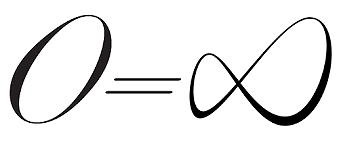NothingMuch

"We're here in the middle, comforted by the edges we imagine constraining us."
I understand nothing about as well as I understand infinity, by which I mean, hardly at all. Like infinity, nothing can appear in a surprising variety of quantities. I can experience Plenty of Nothing as well as NothingMuch. Likewise, infinity can come in any of, dare I suggest, an infinite number of discrete forms. Even Forever After might hold a shorter shelf life than Ever And Ever, for instance. The concept that neither nothing nor everything comes in specific single-serving packets should set me back on my heels. It might be that this explosion of variety never comes into play until one thinks they're experiencing nothing or everything. Then, a multiverse appears. ©2018 by David A. Schmaltz - all rights reserved
Some mornings, I rise convinced that I have nothing to say. The world seems determined to convince me otherwise, as a simple writing trick never fails to demonstrate. When I feel only a void where I expected to find my inspiration, ten minutes spent deliberately not writing, even trying to create pure crap, usually—almost always— taps an unseen well. Likewise, some days when I awaken a little too full of myself, feeling as though I've finally found addressability to my very own infinite, I'm unable to coherently string together two words. Possessing neither nothing nor infinity guarantees much.
Time seems particularly capricious when dancing with nothings as well as when cavorting with infinities, for time's first a sense, hardly a tangible at all. I can feel the absence of time as easily as I can feel unbounded within it. I can insist that I have no time, as if I ever did possess it, and also insist that I have "all the time in the world," as if time were a part of the world. Both delusions completely convince me. I can watch myself constrict when convinced that my time's run out and witness my own unbounded expansion when I've decided that my stopwatch overfloweth with remaining time. I suspect that both convictions amount to illusions, perhaps useful ones.
Both nothing and infinity might be illusory. We have no fingers to count either, to decisively demonstrate either's existence. We rely upon little symbols to represent their presence because they otherwise have no presence. Our whole scheme of conceiving this world, this universe, would be weaker for the absence of either, though none of us have so far ever experienced either one. Our senses can't sense either. We get to the edge then fall back on pure abstraction to complete the sentence, to fully qualify the thought, when we remain completely clueless about that space beyond. Both are plugged values, stand-ins, because the number line cannot tangible reach from beyond any horizon to far beyond any other horizon. We're here in the middle, comforted by the edges we imagine constraining us.


